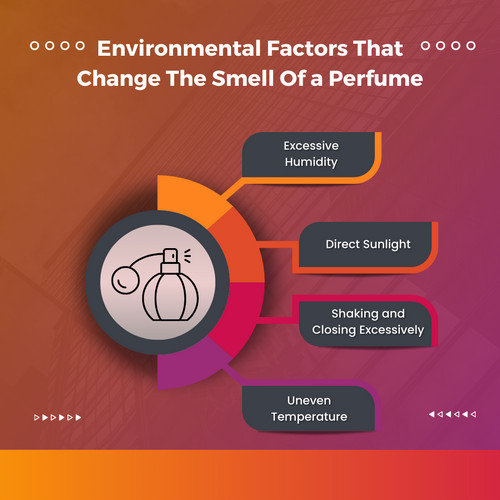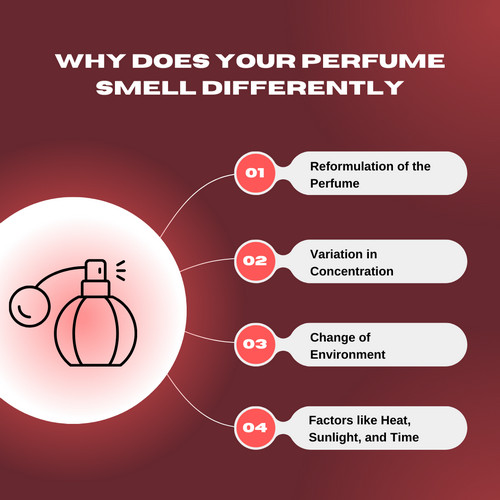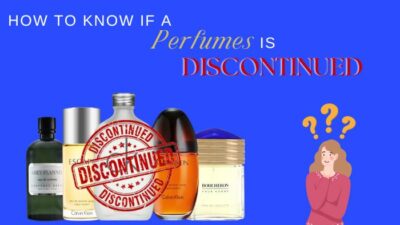We are all unique, so the way my skin goes with any perfume, your skin may not accept it the same way.
I know what it’s like to immediately fancy a fragrance after smelling it on a friend but end up disappointed after buying it. There is actual science behind it, why perfume smells differently on everyone.
You might be wondering what the reasons are and why perfume smells different on everyone.
Keep reading as there are a lot more helpful details ahead to get your questions answered.
Does Perfume Smell Different On Everyone?
Yes, perfumes smell different on everyone because we have different skin types. Factors like pH value, hormonal issues, and sweat set our skin apart. Therefore, perfumes react differently, and the end scent comes off as unique depending on the environment as well.
A single perfume can differ in smell for different individuals. The chemical compounds in a perfume react with our body chemistry and that’s how we perceive the aroma.

Several environmental factors also impact that. A chemical reaction between the body and perfume makes the difference.
How Body Chemistry Creates Scent Variation
All of us have unique body chemistry. How a perfume will smell on us depends on the PH level, sweat, hormones, diet, and other factors. Thus, how you perceive a fragrance on the test strip may differ from the way it smells on you. Any scent develops depending on your overall biology.
The same perfume that smells in a particular way on your sister/brother may not give nearly a similar aroma to you.
Often we buy a fragrance that we find attractive on someone and end up regretting it because the vibe isn’t anywhere closer to us. So, the way your body is shaped dictates a lot about how you will smell with a particular scent.
Here are the major bodily factors that influence the smell variation of a perfume:
1. Skin pH
The pH level in our skin simply refers to the level of acidity or alkalinity on our skin surface. A pH level of 7 is considered neutral. Anything beyond 7 is considered alkaline and the below 7 pH level means acidic.
Generally, our skin surface is leaned towards the acidic level. Any kind of extreme weather, skin problem, or health issue can disrupt the pH level of our skin which eventually affects the performance of a product.
If your skin surface is more acidic then it will make any perfume smell soft and gentle. Conversely, alkaline skin types make the aroma of a fragrance stronger and sharper on the nose. Thus, how you get a whiff of your friend’s scent may not turn out the same on you.
2. Hormone Level
It’s true that your endocrine level is a major factor in dictating how a perfume will smell on you. The hormonal balance in your system impacts heat production in your body. And the bodily heat you produce changes how a scent develops on your skin.
For example, when women are in the third week of their monthly cycle the estrogen level lowers. It produces more heat than usual and that can change your fragrance’s aroma when you apply it.
This happens to men as well. The hormone levels in men fluctuate frequently throughout the day. As a result, it affects the body temperature and sweat level. Thus we often smell our fragrance differently at different times of the day.
3. Skin Type
The nature of your skin plays a big role in terms of dictating the overall smell of your perfume.
Oily skin tends to hold the aroma of any perfume strongly. The top notes of any fragrance are short-lived and they have a light sensation. But, when applied on oily skin the top notes become more potent than usual and since it’s a bit sticky, the perfume doesn’t evaporate easily.
On the flip side, perfume smells comparatively lighter on dry skin. It evaporates faster that’s why you smell it quite differently than your friend who has oily skin.
As a result, people with dry skin type need to use a fragrance that has a solid base and strong smell.
4. Diet
What you eat has a great impact on your overall smell. Often our body releases the smell of the food we eat.
Certain foods don’t get consumed by our digestive system. Rather their essence flows in the bloodstream. Hence, when you apply a perfume, its aroma combines with your bodily smell and you find it different from the test strip.
5. Your Skincare
We apply fragrance on the pulse point of our skin. The texture of our skin helps a lot in making a perfume smell better.
If your skin is properly cleaned and moisturized, any fragrance will perform better. The aroma will become more prominent and detectable.
Also, the soap or body wash you use affects the sensation of your scent. If those are rough, it will make the skin dry and the texture harsh. It will subdue the perfume and deteriorate its smell.
You can wear unscented body products with perfumes to ensure their scent stays intact.
Environmental Factors That Change The Smell Of a Perfume
Apart from the body chemistry and other physical effects, the smell of your perfume can differ depending on several environmental factors. The presence of sunlight, temperature, weather, and other attributes play a significant role in how your fragrance is going to smell.

Here are the environmental factors that make your perfume smell different:
1. Excessive Humidity
Humidity can break the particles down in a perfume. Thus if you live in a place where the weather is rough and very humid, your perfume will smell differently than in temperate regions.
2. Direct Sunlight
Unfortunately, sunlight can quickly degrade fragrances. Furthermore, heat can break down chemical bonds that give the aroma.
3. Shaking and Closing Excessively
It can cause excessive oxygen to enter your perfume bottle and oxidize your scent. Thus when you travel with perfume, make sure to pack them correctly in a secure position.
4. Uneven Temperature
Keeping your perfume where the temperature fluctuates a lot can also damage your scent gravely.
Why Does Perfume Smell Bad After A While?
According to experts, perfumes with lighter notes lose the scent quicker. For example, citrus, floral, and green fragrances don’t last long.
On the other hand, heavier notes will last the longest, so you can enjoy the pleasant smell more.
Most importantly, your perfume can go bad if not stored properly. Fragrances don’t expire, but light and dampness can destroy their structure. Therefore, if your scent smells sour, that’s an indication that it’s no longer wearable.
Moreover, wearing such fragrances can cause severe skin irritations and allergies.
Does Perfume Smell Different On Clothes?
The perfume smells different on clothes because of the fabric type. In other words, fragrance along with your skin can create a unique aroma. However, your clothes cannot do that since it has no inherited scent. Therefore, the smell may be stale in comparison.
Perfumes on clothes and skin indeed have pros and cons. Ideally, you should always apply perfume on the skin to increase the scent’s projection.
At the same time, some fragrances can even stain your clothes.
But, for longevity, clothes effortlessly beat your skin. Perfumes can last for an entire day on your clothes.
In short, clothes can improve the longevity of fragrances with lower concentrations. However, your skin is the best judge of your scent.
Why Does Your Perfume Smell Differently?
You’re not the only one to be taken aback by the scent of your favorite perfume. To clarify, buying a new bottle of the same brand will not guarantee you the same scent.

Here are the reasons why your perfume smells different:
Reformulation of the Perfume
Most fragrances that have been around for a while get reformulated every decade or so. So, although it’s supposed to smell the same, it doesn’t.
Variation in Concentration
EDT, EDP, and EDC have different concentrations, so they smell different. While EDP has the highest amount of perfume oil and lasts pretty long EDT has a comparatively lower concentration of fragrance oil. Hence, a change in the concentration makes a visible difference in the aroma of any scent.
Change of Environment
Changes in your body, pH level, and hormones can affect your skin to perceive the scent. Similarly, changes in temperature and humidity can also have an effect on the perfume smell.
Factors like Heat, Sunlight, and Time
If you do not store your perfume properly, then factors like sunlight and heat can destroy the structure of your scent. Also, sometimes when your perfume bottle breaks and you don’t store it properly, that can deteriorate the scent’s smell as well.
How To Know What Perfumes Smells Good On You?
The art of wearing perfume is as important as choosing the right fragrance.
For instance, a fragrance can smell good on your friend and not on you. Likewise, a paper test will not give you justice about the perfume.

So the best way to test a fragrance is by applying it to your skin. You can spray it on your wrist and judge the aroma. However, never rub your wrists after applying perfumes because that destroys the top notes.
The top note of a fragrance is its introduction to give you an idea of what’s ahead. Therefore, you don’t want to ignore that.
In addition to that, the concentration of perfume is essential. So, you can try testing two fragrances separately on each of your hands and try for a day to see the performance.
You can observe how long it takes for a perfume to evaporate. It will give you an idea about the performance.
But best to try only two at once or just one because too many aromas can cloud your judgment.
Conclusion
Each person’s skin is unique, and so is our natural scent. As a result, perfumes react with our skin producing a distinctive individual aroma.
To sum it up, just try a fragrance on your skin before actually buying them. As a result, scents on your skin will give you the best idea if it’s truly meant for you.
Most importantly, take care of your perfumes by storing them properly.
I hope you find this article helpful and well-informed. Share your thoughts in the comment section below to let us know if there’s anything else we can help you with.



